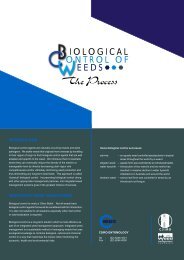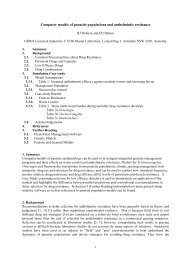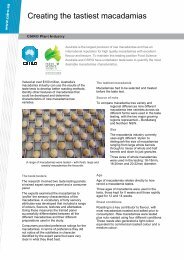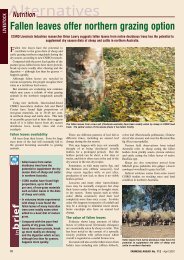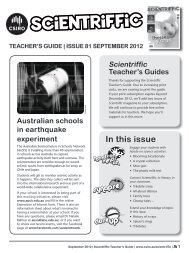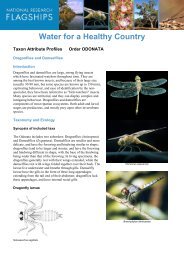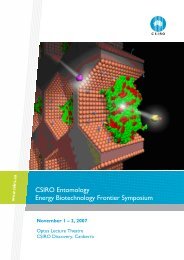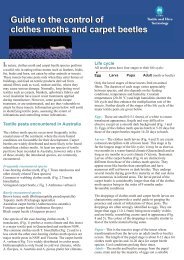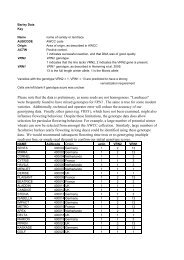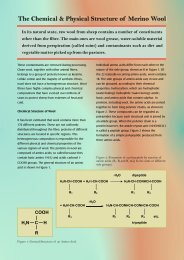WfHC - cover page (not to be used with pre-printed report ... - CSIRO
WfHC - cover page (not to be used with pre-printed report ... - CSIRO
WfHC - cover page (not to be used with pre-printed report ... - CSIRO
Create successful ePaper yourself
Turn your PDF publications into a flip-book with our unique Google optimized e-Paper software.
Edwin David: Oh, we <strong>used</strong> <strong>to</strong> burn it in the winter, in the dry season, first winter [early dry<br />
season]. So that new grass <strong>to</strong> shoot up. We <strong>used</strong> <strong>to</strong> get a lot of cattle there.<br />
Marcus Bar<strong>be</strong>r: Did they burn everything on that country, or just bits and pieces?<br />
Edwin David: Just bits and pieces.<br />
David Hughes descri<strong>be</strong>s the need <strong>to</strong> keep the fires patchy by burning the ridges one year<br />
and the watercourses the next, but he also descri<strong>be</strong>s additional effects of fire on eucalyptus,<br />
and how fire regimes need <strong>to</strong> take account of where the water is:<br />
One of the management practices we <strong>used</strong> was early burning, and that has two effects, it<br />
gives you a good firebreak for later in the year, and it also brings your cattle <strong>to</strong>gether. And if<br />
you do that properly, you get carryover grass, that‟s what you‟ve got <strong>to</strong> manage. And one<br />
year you might go through and burn all your watercourses and leave your ridges. And the<br />
next year you‟ve got old grass on your ridges, so you go through and burn the ridges and<br />
leave the watercourses. It‟s a very important part of the management of that country. And<br />
the other thing it does, and <strong>not</strong> many people are aware, but if you‟ve got a lot of eucalyptus<br />
leaves, they are <strong>not</strong> very palatable <strong>to</strong> cattle, but if you get a cold fire through, it sucks the<br />
sap back out of your leaves, and they‟ll eventually fall on the ground and they can eat them<br />
then. It‟s like putting them in an oven you know, like cooking them. If you burn it early, and<br />
you get those green shoots coming through. That green shoot, if you do it right and s<strong>to</strong>ck it<br />
right, that will take you through <strong>to</strong> about Oc<strong>to</strong><strong>be</strong>r. And then when Oc<strong>to</strong><strong>be</strong>r comes, a lot of<br />
your waters are drying up now, getting dirty, and that grass has gone off so the cattle will<br />
come back on<strong>to</strong> the main waters, and if you‟ve taken them out there <strong>with</strong> a burn, they‟ve<br />
still got lots of soft grass on the good waters.<br />
David Hughes<br />
The cattlemen tried <strong>to</strong> ensure the lighting of fires in the late wet and early dry, and that those<br />
fires <strong>to</strong>ok account of available water. In a longer excerpt <strong>be</strong>low from a conversation about<br />
fires, Philip Yam descri<strong>be</strong>d the specific characteristics of the Oriners landscape, and how<br />
great care needed <strong>to</strong> <strong>be</strong> taken <strong>with</strong> managing fires in the area. This was so as <strong>not</strong> <strong>to</strong><br />
inconvenience neighbours and/or start fires at inappropriate times and places that would then<br />
get out of control:<br />
Marcus Bar<strong>be</strong>r: When you were camping up there, did you do that burning after the wet<br />
season? Did you light the place up in different areas?<br />
Philip Yam: We <strong>used</strong> <strong>to</strong> only do around the homestead. [We] don‟t bother somewhere else,<br />
<strong>be</strong>cause you‟ll only cause a problem, other people don‟t like it. Because when the fire<br />
s<strong>pre</strong>ads, bushfire, there is no way you can s<strong>to</strong>p him.<br />
Marcus Bar<strong>be</strong>r: So even though it was early in the year there and it was still green, you<br />
were still worrying about the neighbours?<br />
Philip Yam: Yeah, see you got a lot of that different grass up there, only just a cigarette butt<br />
can just light that up. You got that other little small grass. Cause when that, [when] you<br />
drop a match on that, you won‟t s<strong>to</strong>p him. It burns easy. And you can‟t s<strong>to</strong>p it <strong>be</strong>cause that<br />
country got wind every time, every day is blowing. Some big wind you get up there, and<br />
then you can‟t s<strong>to</strong>p it when the wind is blowing. You got <strong>to</strong> <strong>be</strong> very careful what time <strong>to</strong><br />
burn. May<strong>be</strong> early hours of the morning or late, may<strong>be</strong> in the night. Wait until the wind is<br />
easing off a bit. But you got <strong>to</strong> <strong>be</strong> very careful, [<strong>be</strong>cause] if that wind pick up again it will go;<br />
the whole grass, the whole country will go up. So that‟s what happened a few times up<br />
there. We get pig shooters coming in early in the year, and they can‟t get pigs, so they light<br />
up some places, and then we get the blame for it, from the neighbours. They say „oh, the<br />
Oriners mob probably dropped that match!‟<br />
Marcus Bar<strong>be</strong>r: Blame from whom? Koolatah and Drumduff people?<br />
Working Knowledge at Oriners Station, Cape York<br />
111



